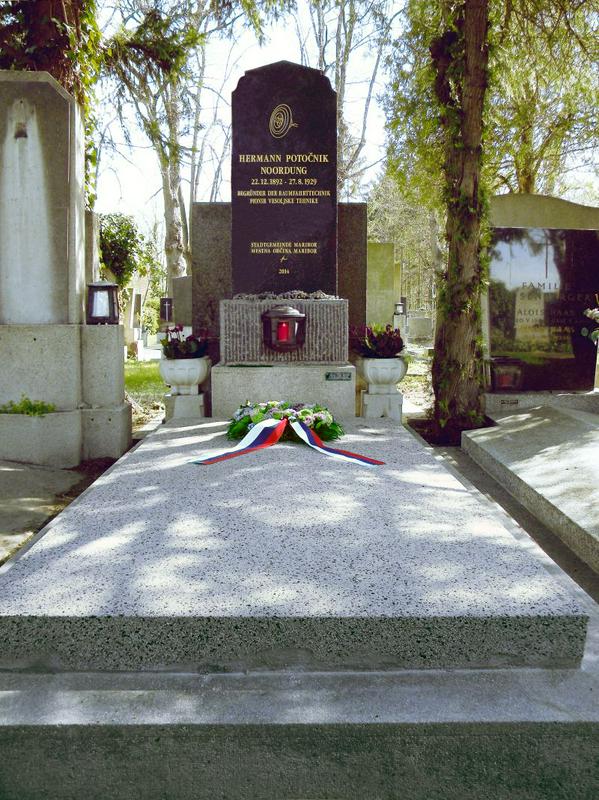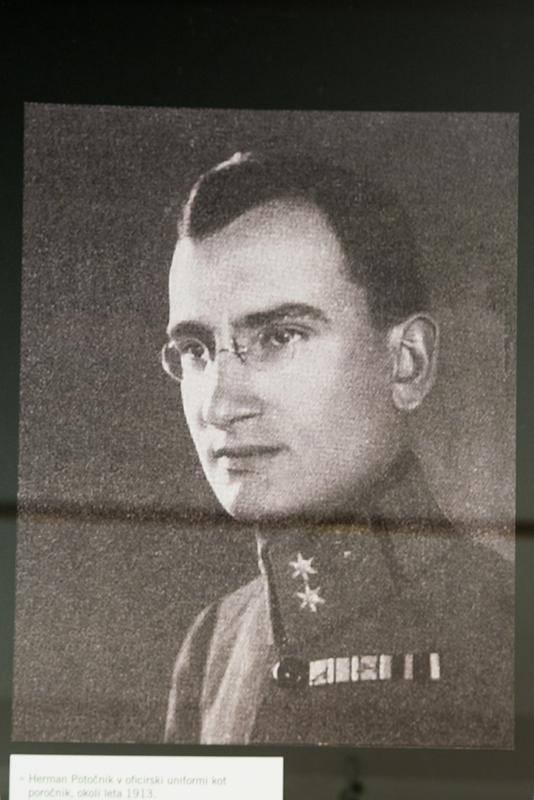
Earlier the Mayor of Vienna, Michael Häupl, immortalised the memory of Potočnik's exceptional scientific accomplishments by granting him an honorary grave.
Celebration ceremony in memory of Noordung
The celebratory ceremony in memory of Noordung took place in the Evangelical cemetery Simmering in Vienna. The large audience was welcomed and addressed by Andrej Rahten, Ambassador of the Republic of Slovenia in Austria, followed by speeches by Boštjan Žekš, Advisor to the President of the Republic of Slovenia, Andrej Fištravec, Mayor of Maribor, Karl W. Schwarz, Ministry Counsellor at the Ministry for Education, Arts and Culture of the Republic of Austria and Primož Premzl, the main initiator of the event. The ceremony, in honour of his exceptional scientific achievements and the man that was Herman Potočnik, was also attended by Astrid Rypar from the Department of Culture of the City of Vienna. A cultural note was added by the concert performance of ''Sound of the Universe'' by the Hugo Wolf Chamber Choir from Maribor.
The memorial cenotaph was blessed by Bishop of the Evangelical Church in Slovenia, Geza Filo and Michael Wolf, Chairman of the Cemetery committee of the Evangelical Augsburg community and Helvetic Church in Vienna.
In the afternoon later that day, Premzl presented a book titled Herman Potočnik Noordung – življenje v besedi in sliki (Herman Potočnik Noordung – his life in words and pictures) at the Slovenian Scientific Institute of Vienna. With a colourful narrative, he took the audience through the important biographical points of Potočnik's too-short life, which some compared to that of a shooting star's – a tiny piece of an immense universe, that appears suddenly, shines brightly for a short while, then disappears forever.
But the memories of the life and work of Herman Potočnik have not disappeared. The achievements of space technology have time and again confirmed Potočnik's far-sighted predictions and preserved him in the historical memoirs of science, to which he devoted his life. The tribute to him, on 11 April 2014, at his last resting place, has again revived the memory of his person, wide and unlimited – just like the universe.
Herman Potočnik, born in Pula (Croatia) in 1892, on the periphery of the then Austro-Hungarian Empire, had Slovenian parents – his father Josef was from Slovenj Gradec and his mother Maria (maiden name Kokoschinegg) was from Maribor. After his father's death in 1894 the Potočnik family relocated to Maribor where young Herman spent the better part of his childhood in the capital of the Slovenian region of Štajerska, which today thrives on the memory of the famous ''fellow citizen''.
He studied at the University of Technology in Vienna, Faculty of engineering in the department of electrical engineering, and he graduated in 1925. Not long after, in October 1928 (the year of publication is noted as 1929), under the pseudonym of Herman Noordung, his book ''Das Problem der Befahrung des Weltraums. Der Raketen-Motor'', appeared in Berlin and brought him the reputation as one of the founders of space technology. In this book he outlined a plan for a breakthrough into space and human habitation there, he considered the technical solutions to the questions of space medicine, while at the same time warning about the dangers that advancement in space technology could bring. Potočnik is considered the inventor of synchronous orbits for geostationary satellites; his rocket motor became the predecessor of the modern reactive motor.
After his death in August 1929, as a member of the Evangelical Church, he was buried in the Evangelist cemetery in Vienna. Over the years, however, the rent for his gravesite was left unpaid and in 1967 was leased to someone else. All traces of Noordung's grave were slowly lost...until 2012, when it was again uncovered by a local history enthusiast from Maribor, Primož Premzl. With the help and guidance of other professionals, Premzl focused his energy on the placement of a new memorial plaque in memory of Potočnik, which was ceremonially unveiled on 11 April, 2014. The ceremony was organised by the Embassy of the Republic of Slovenia in Austria together with the City Council of Maribor, the Slovenian Scientific Institute of Vienna and the Primož Premzl Office of the Arts in Maribor. It is no coincidence that the date selected for the ceremony was so close to 12 April: the day on which, in 1961, Yuri Gagarin was the first man to travel into space, and the international day celebrating space flights with humans on board (International Day of Human Space Flight).
Maja Toš, SINFO


































































